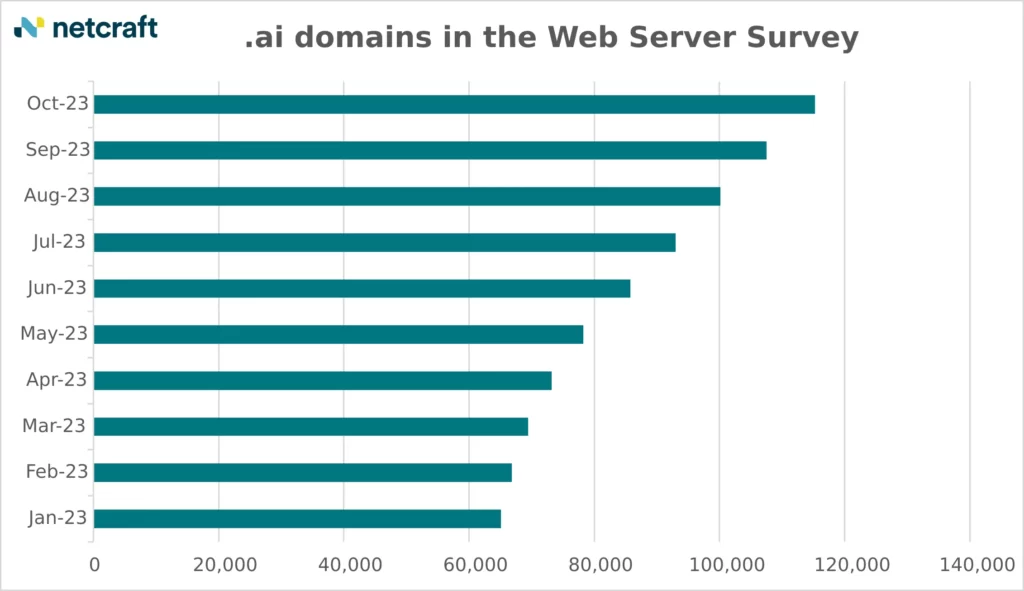Table of Contents
ToggleThe growing excitement surrounding artificial intelligence (AI) has also led to increased Cybersecurity Threats within the domain of AI technologies. As interest and investments in AI continue to surge, the .ai domain space, in particular, has become a target for various security threats. Cybercriminals are exploiting the popularity of AI, using .ai domains for malicious activities such as phishing, spreading malware, and conducting fraudulent operations. This uptick in threats poses significant challenges to the integrity and safety of the AI online infrastructure and necessitates robust cybersecurity measures to protect against potential attacks. Organizations and individuals venturing into the .ai domain must be vigilant and implement strong security protocols to safeguard their digital presence.
Varieties of Cybersecurity Threats on .ai Domains
There’s been a noticeable rise in nefarious content on .ai domains, including:
Impersonation Schemes: These are fraudulent websites posing as trustworthy sources to deceive individuals into downloading harmful software or disclosing sensitive information, like login credentials or financial data.
Deceptive Affiliate Tactics: A multitude of deceptive strategies designed to trick users into clicking affiliate links, leading them to purchase products or services from a third-party vendor, benefiting the scammer.
Website Vandalism: Attacks where cybercriminals hack and modify the website’s content, often leaving a boastful message about the intrusion.
Fake Cryptocurrency Ventures: Fraudulent websites luring investors with the promise of profitable returns on nonexistent cryptocurrency projects.
Digital Backdoors: Cybercriminals upload small scripts or programs to compromised servers, creating web shells that enable them to execute commands remotely through a web interface,
Exploitation of Artificial Intelligence’s Rising Fame by Cybercriminals:
As the excitement around AI advancements, especially with platforms like ChatGPT, reaches new heights, Netcraft’s latest study highlights an uptrend in the malicious use of .ai domains. Cyber offenders are creating deceptive AI-themed websites to ensnare unsuspecting individuals.
Related Article – AI could worsen cyber-threats, report warnsAI could worsen cyber-threats, report warns
Boom in .ai Domain Registrations:
The .ai ccTLD, originally designated for Anguilla, is experiencing a boom, largely due to the burgeoning artificial intelligence sector. Major corporations, including Google and Meta, have embraced .ai domains to promote their AI projects, mirroring an industry-wide adoption. The .ai domain has experienced an explosive increase in use, with a 12,000% rise since 2013.
Escalation of Malicious Online Behavior:
Netcraft’s findings indicate a spike in .ai domain exploitation for phishing and other malicious schemes in 2023, with a significant portion of these activities aimed at deceptive marketing ploys and fake prize giveaways.

Web servers using .ai domains. Source Netcraft
High Demand Despite High Prices:
The higher costs associated with .ai domains do not deter criminals, who value the domains for their perceived authenticity. This authenticity is exploited in various frauds, particularly those involving cryptocurrencies. The general hype around AI is eroding conventional online safety practices, leading to greater trust in, and clicks on, .ai links, thanks to their association with reputable AI ventures and increased press coverage.
Emerging Threats in the .ai Domain:
While the .ai domain space is comparatively niche, it is growing at a rapid pace, presenting numerous untapped opportunities for malevolent use. Future phishing risks are of particular concern, with the potential for .ai domains to be confused with .au domains due to keyboard layout similarities—a phenomenon not yet widely exploited.
Phishing schemes dominate the malicious web activity on .ai domains, representing 67% of such URLs, while survey cons constitute about 11%. In these survey cons, victims are duped into believing they have won a prize and are persuaded to complete a survey, which typically doesn’t result in any actual data submission. Post-survey, victims are rerouted to another site that signs them up for a third-party service, usually a lottery with minimal chances of winning the purported prize. Affiliate marketing frauds often use .ai domains as a conduit for redirecting to the primary scam-hosting domains. As a result, these .ai domains associated with malicious acts tend to use a narrower set of IP addresses compared to other forms of cyberattacks.
#Cybersecurity Threats #Cybersecurity Threats #Cybersecurity Threats
Related Article – Artificial Intelligence will be as intelligent as humans by 2028